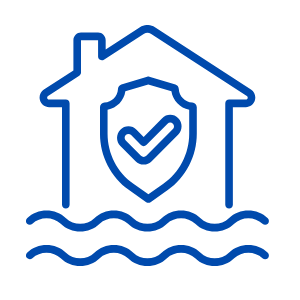
The project focusses on flooding of coastal and riverine communities due to sea level rise in the Caribbean Community (CARICOM) countries of Guyana, Trinidad and Tobago, and St. Lucia. It aims to build resilience to flooding through understanding the connectivity between terrestrial, freshwater and coastal systems and the affected people. It will support improved policy and governance structures, that reduce the social, economic and environmental damages as a consequence of climate change. The project will be co-designed with communities, and agencies that undertake flood monitoring, adaptation and mitigation.
Research questions are:
- What are the projected sea level rise, coastal dynamics, and tidal fluctuations expected in future climate scenarios?
- What is the extent of disruptions to human populations, economies, health, and livelihoods due to flood inundations?
- What are the socio-economic drivers and coping mechanisms to flooding by coastal and riverine communities?
- Using adaptive management, what types of flood control and adaptation mechanisms are required to cope with future flooding scenarios?
- What are the government policies, institutional frameworks, land use and zoning regulations and social networks required for resilience? The outcome is a CARICOM Flood Resilience Framework.
Work Packages and Deliverables:
 WP 1. Community learning and co-creation of flood mitigation measures
WP 1. Community learning and co-creation of flood mitigation measures
Deliverable:
A community learning platform. The platform will also include learning information from St. Cuthbert’s mission, as to how they cope with floods. Other coastal communities can learn from the St. Cuthbert mission, best practices to flood adaptation, and food security developed by the Indigenous community 11,000 years ago.

WP 2. Data systems for decision making
Deliverable:
An integrated, co-designed data base management system to aid decision-making.
 WP 3. Hydrological and hydraulic modelling
WP 3. Hydrological and hydraulic modelling
Deliverables:
i) Simulation models for flood forecasting and mitigation planning;
ii) Technologies recommended for flood alleviation and protection of infrastructural assets;
iii) User-friendly web-based portals to visualise flood modelling outputs for real-time flood guidance and future planning.
 WP 4. Inclusive and adaptive flood risk governance
WP 4. Inclusive and adaptive flood risk governance
Deliverables:
i) A shared understanding of aspirations for and the barriers and enablers to inclusive and adaptive FRG, co-production;
ii) A co-developed roadmap for inclusive and adaptive FRG in Guyana and Trinidad.
 WP 5. Capacity development
WP 5. Capacity development
Deliverables:
i) Trained cadre of highly qualified personnel in the Caribbean;
ii) New tools and skills delivered to vulnerable communities in disaster flood management and recovery;
iii) Communities and local experts trained to collect data as part of citizen science and technological innovation;
iv) Delivery of McGill’s on-line postgraduate certificate in collaborative, integrated and adaptive water management.
 WP 6. Building flood resilience in communities both nationally and regionally
WP 6. Building flood resilience in communities both nationally and regionally
Deliverables:
i) Flood risk indicators and formulation of dynamic hypotheses for system dynamics model development;
ii) Creation of citizen science observatories and social media networks;
iii) Institutionalization of an improved land-use framework to reduce flood vulnerability;
iv) Knowledge dissemination to the wider Caribbean region.